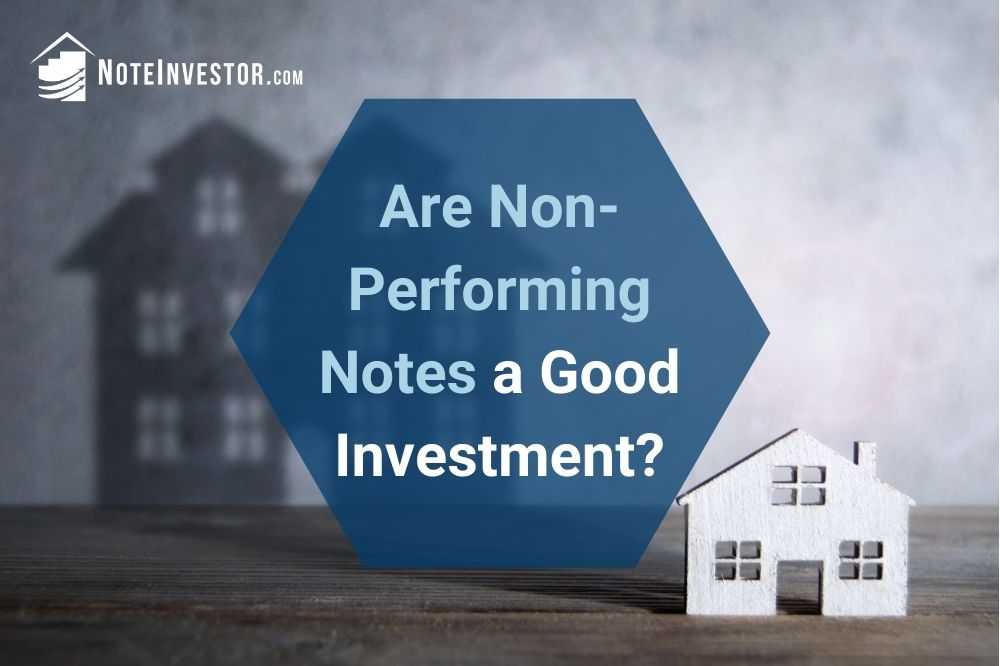No question, purchasing performing notes is an excellent alternative to investing in physical real estate.
In addition to not dealing with tenants and toilets, you set your own yield requirement, type of property, or payer. You can even implement ways to minimize your overall exposure through partials.
So, with performing notes paying so well…what about NON-performing notes?
Well, to answer that question, let’s start with defining what non-performing notes are…
A non-performing mortgage is a note where the payor is behind in payments. This could be 30 days past due or, more likely, three or more months behind.
The attraction to purchasing these notes is clear.
- You feel you can get the payor back ‘on track’ to making timely payments and…
- You will get an even better return since you, most likely, paid LESS for this type of paper vs. a performing note.
How much more of a discount do you get for non-performing paper?
Sadly, there is no set rule regarding what a non-performing note will go for in the private investor market.
There was a time when these notes rarely went for more than 60 cents on the dollar, but the recent increase in home values has put an essential variable in the equation…they could have equity.
With values going up, the typical defaulted paper may have even more value in the property – making it less likely to truly sell for below balance at foreclosure – and may even turn into a real profit upside.
Let’s take a look at how equity comes into play.
Example one: 3 months past due
Note Balance: $98,750.00
Property Value: $105,000.00
LTV: 94%
*****************************
Example Two: 10 months past due
Note Balance: $98,750.00
Property Value: $135,000.00
LTV: 73%
In the second example, the payor is further behind in payments—seven additional months, in fact. At first glance, that might appear like the riskier note.
But, when we dig a little deeper, we see there is far more equity* in the property in example two than the first one.
*Equity is the difference between what the payor owes and the value of the property.
When purchasing a non-performing note, there are TWO key questions to ask.
- What is the likelihood, when I purchase this note, they will get back on track and start making timely payments?
- IF they DO NOT get back on track, what is the likelihood I will get my money out of this deal (or even make a bigger profit).
Question one is answered by what has led them to be behind in the first place? Is it a one-time problem (loss of job, divorce, relocation), or is this something that is systemic in reviewing their credit history?
Question two is answered by the equity in the property (LTV) – OR – the amount of money you paid for the note (ITV).
Example one does not look very attractive at first, but if I could purchase the note at 60 cents on the dollar, thereby making my ITV 56%, it seems a lot better!
There are plenty of places to find non-performing notes but start with…
Note Investors
Online Platforms (like Notes Direct or Paperstac)
Real Estate Clubs
Credit Unions and Banks*
Note Servicing Companies
*Although worth mentioning, Credit Unions and Banks will not typically sell notes one at a time. They move portfolios of defaulted paper.
How do you feel about cars that don’t run?
I always think of non-performing notes as purchasing an old classic car that doesn’t run.
You can purchase the most beautiful antique car that doesn’t run…but it is just a giant paperweight if you can never get it running.
Someone purchases a classic car in that condition because they know what it takes to get it back up and running. They know the price of the engine, bodywork, maybe even a new paint job.
They also know once they restore the car, what it is worth on the open market.
With a note, you are buying something that, at the moment, is not running properly.
Does that automatically mean walk away – absolutely not. But, tread lightly and understand the risks that go along with it.



I think that you need to have a conversation about note servicers and the necessity of them in your investing portfolio. No one seems to express their real value. We need them to keep the paperwork up to date. Services to the mortgagor. Legal commitments that are punishable to the mortgagee. ETC. Please have a detailed conversation with suggestions about who, what and where to secure a servicer. Also, the services they provide.
Thanks
Mike
I love that classic car analogy! I hadn’t heard it before..